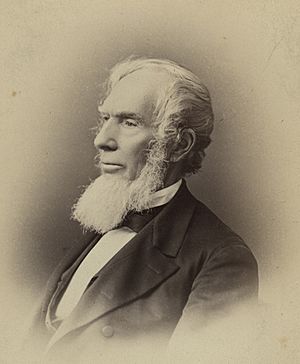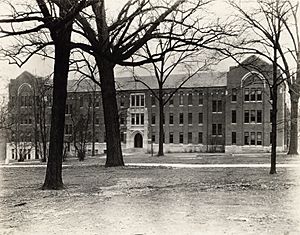Landon Garland facts for kids
Quick facts for kids
Landon C. Garland
|
|
|---|---|

Portrait of Chancellor Landon C. Garland
|
|
| 1st Chancellor of Vanderbilt University | |
| In office 1875–1893 |
|
| Succeeded by | James Hampton Kirkland |
| President of the University of Alabama | |
| In office 1855–1865 |
|
| 2nd President of Randolph-Macon College | |
| In office 1836–1846 |
|
| Preceded by | Stephen Olin |
| Succeeded by | William Andrew Smith |
| Personal details | |
| Born | March 21, 1810 Nelson County, Virginia, US |
| Died | February 13, 1895 (aged 84) Nashville, Tennessee |
| Resting place | Vanderbilt Divinity School Cemetery, Nashville, Tennessee |
| Spouse | Louisa Frances Garland |
| Children | Annie Rose Garland Fulton Carrie Matilda Garland Thompson Alice Virginia Garland Louise Frances Garland |
| Parents | Alexander Spotswood Garland, Lucinda Rose Garland |
| Relatives | Hugh A. Garland, (brother), James Madison, (great-uncle), Samuel Garland, Jr., (nephew) |
| Alma mater | Hampden–Sydney College (BA) |
Landon Cabell Garland (1810–1895) was an important American educator. He was a professor of science and history. He also served as president of three different universities in the Southern United States. These included Randolph–Macon College (1836–1846), the University of Alabama (1855–1867), and Vanderbilt University (1875–1893). Before the American Civil War, he held complex views on slavery. However, after the war, he became a strong voice against it.
Contents
Early Life and Family
Landon Garland was born on March 21, 1810, in Nelson County, Virginia. He was a very bright student. In 1829, he graduated with top honors from Hampden–Sydney College. His older brother, Hugh A. Garland, was a lawyer. He was also involved in the famous Dred Scott Supreme Court case.
Landon's parents were Alexander Spotswood Garland and Lucinda Rose. An interesting family connection is that James Madison, the fourth President of the United States, was his great-uncle. Also, Samuel Garland, Jr., a general in the Confederate States Army during the Civil War, was his nephew.
A Career in Education
Landon Garland dedicated his life to teaching and leading universities.
Early Teaching Roles
From 1829 to 1830, Garland taught chemistry and natural philosophy (which is like early science) at Washington College in Virginia.
He then moved to Randolph-Macon College in Virginia. There, he taught chemistry and natural history from 1833 to 1834. He quickly became the head of that department. From 1836 to 1846, he served as the second president of Randolph-Macon College.
Leading the University of Alabama
In 1847, Garland moved to the University of Alabama. He taught subjects like English literature, public speaking, and history. He became the university's third president in 1857. He served until 1867.
During his time there, he worried about students' behavior. He tried to make the university more like a military school. This was to encourage discipline and honor. The American Civil War (1861–1865) greatly impacted the university. In 1865, Union soldiers burned the campus to the ground.
After the war, Garland tried to rebuild the university. But only one student signed up for classes in 1866. So, he resigned and left Alabama.
Becoming Chancellor at Vanderbilt
In 1867, Garland became a professor at the University of Mississippi. There, a Methodist leader named Bishop Holland Nimmons McTyeire met him. Bishop McTyeire wanted to build a new Methodist university in Nashville, Tennessee. He asked Garland, who was a respected academic, to help.
Garland believed in the need for educated leaders. He wrote many essays about it. With Garland's help, Bishop McTyeire found a wealthy supporter, Commodore Cornelius Vanderbilt. In 1875, Landon Garland became the first chancellor of the new Vanderbilt University.
Shaping Vanderbilt University
Chancellor Garland had clear ideas for Vanderbilt. He planned for four main departments: Biblical Studies, Science and Philosophy, Law, and Medical. He believed that a university's main goal was to help students develop good character.
Every Wednesday, he would preach sermons to the students in the chapel. He was also strongly against dormitories. He thought they were "injurious to both morals and manners."
One interesting event happened with the law students. Garland invited John Sherman to speak. John Sherman was the brother of General William Tecumseh Sherman. General Sherman was a Union general who had caused a lot of destruction in the South during the Civil War. The law students were upset. They protested by walking out of the speech. Some even played the song Dixie on their harmonicas.
Bishop McTyeire died in 1889. Two years later, in 1891, Garland offered to resign. The university's board accepted his resignation in 1893. James Hampton Kirkland became the next chancellor.
Views on Slavery
Before the Civil War, Landon Garland owned enslaved people. He received some as gifts when he got married. He also bought families to keep them together. He would sometimes rent them out as house servants. He stated that he owned their "labor" rather than the people themselves. He tried to explain this view in a lecture in 1860. He said that enslaved people had been "elevated and improved" through slavery. He believed they could do valuable work.
After the Civil War, it became safer to speak out against slavery. Garland then became a strong opponent of owning people. He gave many sermons through his Methodist Church. These sermons spoke about the wrongs of slavery.
Personal Life
Landon Garland was married to Louisa Frances (1812-1889). They had several children:
- Annie Rose Garland Fulton (1843-1893). She married Robert Burwell Fulton, who later became chancellor of the University of Mississippi.
- Lucinda Rose Garland Lewis. She married Burwell Boykin Lewis, a lawyer and congressman. He also served as president of the University of Alabama.
- Louise Frances Garland. She married Milton W. Humphreys. He was the first professor of Greek and Latin at Vanderbilt University.
Landon Garland passed away on February 13, 1895, in Nashville. He was buried in the Vanderbilt University Divinity Cemetery.
Legacy
Landon Garland's personal papers are kept in a collection. They include his letters, diaries, speeches, and sermons. These papers offer a look into his personal life.
Several buildings are named in his honor:
- Garland Hall at Vanderbilt University in Nashville.
- Landon Cabell Garland Hall at the University of Alabama in Tuscaloosa.
- A dormitory at Randolph-Macon College.
His portrait was painted by his great-granddaughter, Louise Lewis. Copies of this portrait hang at Vanderbilt University and the University of Alabama.


